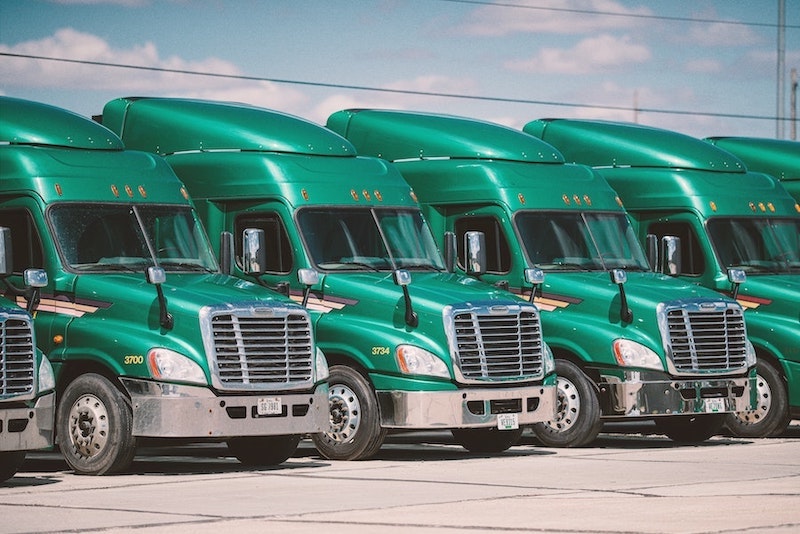Are you a trucker who is looking to start your own trucking business? If so, you’re in luck. If you love driving and logistics, starting a trucking company could be the perfect next step. With over 70% of all freight in the United States moving through trucks every day—there is still an immense demand for transportation services with ample opportunities at hand for those who know how to find them. This post will guide you through some essential steps to get your business off the ground.
Early predictions point toward increased rates for the years to come. Discounting a few market dynamics like fuel prices, increased competition, stringent rules, etc., it would appear that starting a transportation business isn’t a terrible idea.
Start with a Business Strategy
To begin, you should make a business strategy that outlines how your business will survive in the current market conditions, how you will steer the business in predictable future conditions, and how it will survive and thrive in unpredictable market conditions. A design for your company strategy is essential if you want to grow quickly. Like most people, you probably don’t want to be stuck with one truck only earning a few points more than you could be making working for a bigger company.
Registering the Business
Take a look at the different kinds of business entities before submitting your paperwork for incorporation. Each entity offers various personal liability protections, taxation requirements, and ownership structures that will play a big role in how agile the company is down the road.
Once you’ve filed the articles of incorporation and received your EIN (Employer Identification Number), you still need to get permits, licenses, insurance, compliance paperwork, company policies, hiring policies, and more.
Since we can’t explain the process for every state in one article, it is highly recommended that you either hire a professional to help you or do ample research to get all of the building blocks listed out before getting started. You may find out that you’ve boxed yourself into a corner down the road if you fail to plan.
Licenses And Permissions
If you’ve had your eye on starting your own business in the trucking industry, it’s important to make sure that your operational licenses and permits are in order. Most states will require a business license, DOT number, and Insurance, at a minimum to operate within its boundaries. An International Registration Plan (IRP) must also be obtained when moving above 26K pounds across state lines– affording both operators privileges throughout the US.
Other items companies must have to abide by state and federal laws:
- A USDOT Number is a unique identifier that every carrier needs to uniquely identify themselves on the road.
- The Operating Authority dictates what type of cargo can be carried.
- Heavy Vehicle Use Tax (HVUT) helps fund highway programs through federal taxes on trucks weighing over 55,000 pounds.
- IRP distributes its fees based on the distance traveled within each state; it also ensures proper distribution for those who may not be able to afford them.
- The FMCSA Clearinghouse is an important resource for any company needing to stay in compliance with drug testing regulations and customer contracts. It is a relatively new requirement that all Commercial Motor Carriers register.
This is FAR from everything you need to be successful. Don’t be discouraged going through all the mud, which these steps bring a lot of. You may consider hiring a third party to help with these.
Insurance
It’s crucial to have the right insurance in place before starting your own trucking company. You’ll want public liability, cargo, and physical damage coverage as a minimum. Since the insurance market is always changing and depends heavily on the specific situation of the policyholder, it is recommended that you consult with a trusted insurance broker.
Truck & Trailer Combos
Commercial trucks come in all shapes and sizes, with different features that can impact critical things like fuel efficiency, state and federal fees, and towing capacity. Some personal factors should be considered, including price range and comfort level as well as preferred cab style, weather resistance levels, cab size, noisiness on the roads, and more.
Leasing offers have some advantages, but it’s not for people who want the benefits of owning a truck or keeping the monthly expenses low. If your budget can’t afford extra expenses like repairs or maintenance, leasing might be a worthwhile option to look into.
Securing Finances
Trucking is a lucrative business, but it’s going to require some capital to get things rolling. Having funding and an account or credit card open will make it easier to disperse funds when they are needed.
You should expect other costs when running your business, such as fuel, fuel taxes, licenses, registration of proper documents along with insurance, maintenance of your trucks, operating and accounting tools that help keep records organized, etc.
Equipment financing loans are a great alternative and also offer borrower-friendly repayment terms. Under this category, you’ll find commercial truck loans for buying or leasing new trucks as well as repairing your old ones.
You may also want to consider applying for lines of credit with trusted banks so you have access to capital when necessary as well.
Invest in Load Sourcing Technology
The load board industry can seem like a casino to fresh eyes, but it’s also an important and growing part of the trucking landscape and how the fastest-growing companies can pick up so much momentum. There are various options to choose from that are tailored to companies of all sorts. Whether you are starting a log hauling business in Alaska, or a water hauling business in Midland, it’s worthwhile to invest the time and effort to set up accounts on the leading load board sites. At a minimum, they will be there as a backup when you need them.
Best Time to Start a Trucking Company
The internet is growing at breakneck speeds. With rising e-commerce volumes stemming from more people ordering online, and the fluid labor markets creating pressure for both warehousers and transportation service providers, it would be safe to assume that the freight industry will continue to expand over the long run.
With hopes of alleviating growing pains, many lenders are creating new programs for people to purchase equipment. Combined with the expansion of technology solutions, the road ahead should be less burdensome than in previous years, and many problems that have caused delays should disappear.
Rising fuel prices combined with the rising cost of parts and labor are challenges that are sure to create resistance for new companies and companies who have failed to adopt technology solutions that compensate for certain novel problems that didn’t exist 5 years ago.


